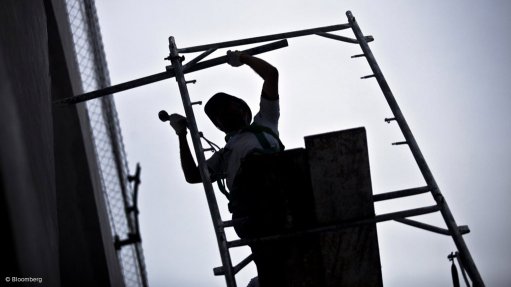
Photo by: Bloomberg
While a healthy appetite for investment in government’s infrastructure development programme existed among international and domestic providers of capital, policy coherence, a clear roll-out strategy and a champion in government were critical to triggering this injection of funding into the country’s critical scale projects, it emerged at a session of the Southern African Metals and Engineering Indaba, in Johannesburg, on Friday.
“I sincerely believe that the moment government is organised in terms of what they want to roll out, the private sector can execute on those projects and, as banks, we have a commitment to invest in infrastructure, so we’re ready and in position to provide project financing once these projects become viable,” Standard Bank Corporate and Investment Banking power and infrastructure South Africa head Mosiah Ntlai commented during a panel discussion on South Africa’s infrastructure backlog.
Citing varied sources of available funding, he said Standard Bank was able to leverage funding from its own balance sheet, capital markets, development finance institutions and export credit agencies.
“We can leverage the capital, but we’re looking for government and the private sector to drive these projects,” he said.
Noting that government had to be the “first mover” in terms of the roll-out of major infrastructure projects, Ntlai added that previous public–private funding successes had largely followed government’s appointment of highly skilled advisers to draft tender documents, manage an open and transparent tendering process and ensure the execution of the work programme.
The State should further ensure that the local economic and political conditions were conducive to investment, while outlining a clear strategy that detailed development plans for energy, transport, water and sanitation infrastructure.
“Government [also] needs a very clear political champion and a senior member of Cabinet that will stick his neck out and says he will drive the programme, which gives capital funders confidence,” he remarked.
Meanwhile, in a further bid to stimulate investment, Ntlai encouraged the private sector to study government’s sectoral infrastructure development plans and submit project bids that were appropriate for the scope and needs of these plans.
“Companies should, thereafter, put down resources and [collaborate] with local partners to ensure that there is localisation so that communities understand the long-term benefits of infrastructure programmes,” he asserted.
Scaw Metals CEO Markus Hannemann, meanwhile, took the opportunity to appeal to government to bring large development projects to market, saying that the continued stalling of these projects was threatening the health of the built environment sectors.
“We are pleading with government… please roll out infrastructure… it’s never been so bad. Our businesses are standing idle,” he commented.
The Southern African Metals and Engineering Indaba was hosted by the Steel and Engineering Industries Federation of Southern Africa.